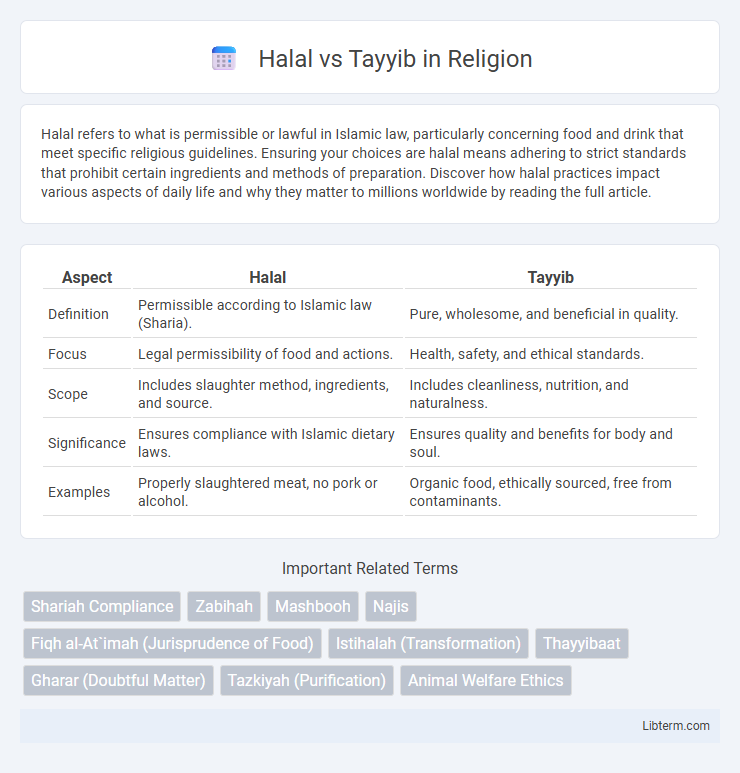Halal refers to what is permissible or lawful in Islamic law, particularly concerning food and drink that meet specific religious guidelines. Ensuring your choices are halal means adhering to strict standards that prohibit certain ingredients and methods of preparation. Discover how halal practices impact various aspects of daily life and why they matter to millions worldwide by reading the full article.
Table of Comparison
| Aspect | Halal | Tayyib |
|---|---|---|
| Definition | Permissible according to Islamic law (Sharia). | Pure, wholesome, and beneficial in quality. |
| Focus | Legal permissibility of food and actions. | Health, safety, and ethical standards. |
| Scope | Includes slaughter method, ingredients, and source. | Includes cleanliness, nutrition, and naturalness. |
| Significance | Ensures compliance with Islamic dietary laws. | Ensures quality and benefits for body and soul. |
| Examples | Properly slaughtered meat, no pork or alcohol. | Organic food, ethically sourced, free from contaminants. |
Understanding the Concepts: Halal and Tayyib
Halal refers to what is permissible according to Islamic law, primarily focusing on food and drink allowed for consumption. Tayyib extends beyond permissibility, emphasizing wholesomeness, purity, and ethical sourcing to ensure food is not only lawful but also good, healthy, and beneficial. Understanding the distinction between Halal and Tayyib highlights the importance of both compliance with Islamic dietary rules and promoting well-being through quality and integrity.
Islamic Foundations of Halal and Tayyib
Halal and Tayyib are foundational concepts in Islamic dietary laws, with Halal referring to what is permissible under Shariah law, primarily addressing lawful food and practices. Tayyib complements Halal by emphasizing purity, wholesomeness, and ethical considerations in food consumption, ensuring it is good, clean, and beneficial for health. These principles originate from the Quran and Hadith, guiding Muslims to consume not only lawful but also wholesome and ethically sourced products, reflecting a holistic approach to physical and spiritual well-being.
Key Differences Between Halal and Tayyib
Halal refers to what is permissible under Islamic law, primarily focusing on the method of slaughter and avoidance of prohibited substances such as pork and alcohol. Tayyib encompasses a broader concept emphasizing purity, wholesomeness, and healthfulness of food, including nutritional value and ethical production. The key difference lies in Halal's legal permissibility versus Tayyib's emphasis on quality and ethical integrity in consumption.
Halal Certification: What Does It Cover?
Halal certification ensures that products comply with Islamic dietary laws, covering aspects such as permissible ingredients, hygienic processing, and ethical sourcing. This certification validates that food, beverages, cosmetics, and pharmaceuticals are free from prohibited substances like pork, alcohol, and contaminants. Halal certification also involves regular inspections and audits to maintain adherence to Shariah-compliant standards throughout the supply chain.
Exploring the Scope of Tayyib in Daily Life
Tayyib, an extension of Halal, emphasizes not only permissibility but also purity, wholesomeness, and ethical sourcing in daily consumption and lifestyle choices. It encompasses food safety, nutritional value, animal welfare, environmental sustainability, and honest business practices, promoting overall well-being and spiritual health. Embracing Tayyib encourages mindful living, fostering trust in food quality and supporting responsible production and consumption habits.
Food Production: Halal Compliance vs. Tayyib Standards
Halal food production emphasizes strict adherence to Islamic dietary laws, ensuring that ingredients, slaughtering methods, and handling processes comply with religious regulations. Tayyib standards extend beyond halal permissibility by incorporating principles of cleanliness, wholesomeness, sustainability, and ethical sourcing, promoting overall food quality and safety. Integrating Tayyib criteria within halal compliance encourages producers to prioritize environmental responsibility and animal welfare alongside religious requirements.
Ethical and Environmental Perspectives on Tayyib
Tayyib goes beyond Halal by emphasizing ethical practices such as humane animal treatment, fair labor conditions, and ecological sustainability in food production. It advocates for environmentally responsible farming methods, reduced chemical usage, and preservation of natural resources to promote overall well-being. This holistic approach aligns with growing global demand for sustainable and ethically sourced food products.
Consumer Awareness: Choosing Halal or Tayyib
Consumers increasingly prioritize Halal and Tayyib certifications to ensure ethical, safe, and high-quality food choices aligned with Islamic principles. Understanding Tayyib extends beyond Halal's permissibility, emphasizing purity, wholesomeness, and nutritional value, which influences purchasing decisions among discerning buyers. Rising awareness campaigns and certification standards empower consumers to make informed choices that support sustainable and responsible consumption.
Common Misconceptions About Halal and Tayyib
Many people mistakenly believe that Halal and Tayyib are synonymous, while Tayyib emphasizes wholesomeness, purity, and ethical sourcing beyond the permissibility indicated by Halal. Halal strictly refers to what is lawful under Islamic law, but Tayyib requires that food be nutritious, clean, and free from harmful substances. Confusing these concepts can lead to misunderstandings about the quality and ethical standards expected in Islamic dietary practices.
The Future of Halal and Tayyib in the Global Market
The future of Halal and Tayyib in the global market is driven by increasing consumer demand for ethically sourced, safe, and high-quality products that comply with Islamic dietary laws. Halal certification combined with Tayyib principles emphasizes not only permissible ingredients but also wholesomeness, health, and environmental sustainability, positioning these products favorably in expanding markets such as Southeast Asia, the Middle East, and among Muslim minorities in Western countries. Innovations in supply chain transparency and technology integration, including blockchain for traceability, are set to enhance trust and growth in the Halal and Tayyib sectors worldwide.
Halal Infographic

 libterm.com
libterm.com